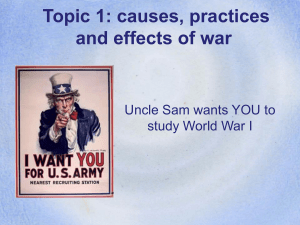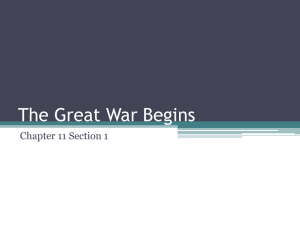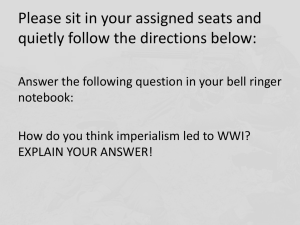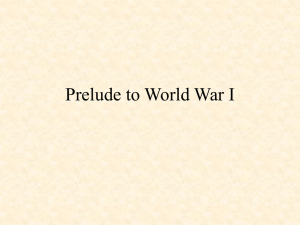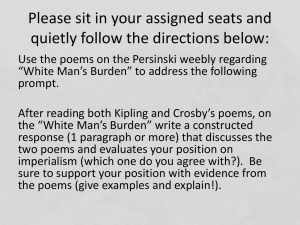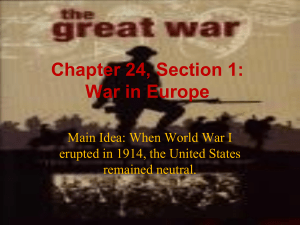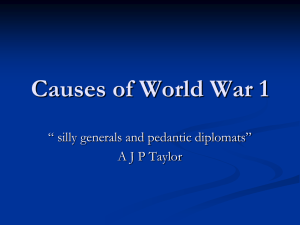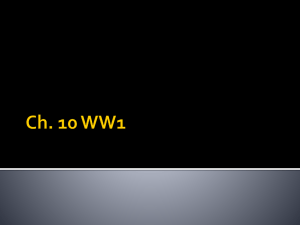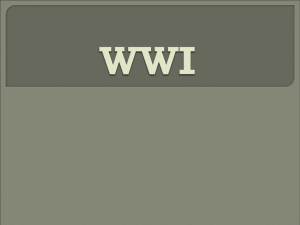The Great War IB
advertisement
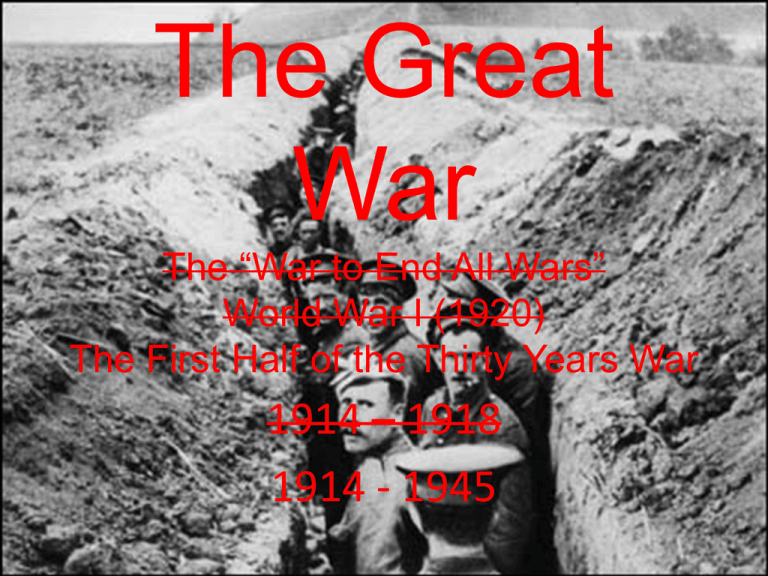
The Great War The “War to End All Wars” World War I (1920) The First Half of the Thirty Years War 1914 – 1918 1914 - 1945 • World War I or The Great War was a major war centered on Europe that began in the summer of 1914. The fighting ended in November 1918. This conflict involved all of the world's great powers, assembled in two opposing alliances: the Allies and the Central Powers. More than 70 million military personnel were mobilized in one of the largest wars in history. More than 9 million combatants were killed due to technological advances in firepower without corresponding advances in mobility. It was the second deadliest conflict in history. Was World War I a “moral crusade”? Can any war be considered “moral”? Will Capitalism undo itself by generating the conditions for selfdestruction? The Great War “Words fail to give any conception of the desolation. No convulsion of Nature could have done what man and man’s machines have done. We bumped our way along a partly repaired road…passing craters from those 10 to those 30 feet across, and some almost as deep; passing rows and rows of old wire entanglements, communications trenches, line upon line of fighting trenches, all more or less obliterated. Finally past the German first line, barely recognizable except for the fact that the entrances to the dugouts now faced east instead of west…….” The Great War “It was an upheaval of sandbags, accoutrements, broken rifles not worth salvaging, entrenching tools, cartridge clips and machine-gun ribbons, food tins, water bottles, helmets, trench mortars, unexploded shells of every size, hand grenades, to which we give a wide berth, a human tibia exhumed from somewhere, bits of clothing---and often smells, though two moths have given ample time for burials. What may be in the bottom of the pits, however, one can only guess…the whole western side of the slope was seething with people making new roads and engaging in the ant-like activity of man when he too burrows and builds and carries up food and takes away grains of sand.” Why Fight? • “Statesmen fight for lofty goals and abstract ideals.” – Pamela Crossley – Germany: defended the cause of civilization against Slavic barbarism, French decadence and British greed. – British, French and Americans: all fought to “make the world safe for democracy” against German militarism. – By 1918, these lofty goals had been outlived by reality – In reality, the war was not a moral crusade, but a power struggle between European Nations. Why Fight? • Soldiers – Moral responsibility (pretext) – Civic duty and Nationalism (usually exacerbated by the press) – Heroism and Glorification of Warfare – Conscription – Employment – Underestimation of the magnitude and severity of warfare Underestimation • “No one understood the magnitude of the guns of August.”– Lynn Lees By 1918, 60 declarations of war had been made SOLDIERS INVOLVED: 65,038,810 MILITARY DEATHS: 8,020,780 CIVILIAN DEATHS: 6,642,633 MILITARY WOUNDED: 21,228,813 Modernity and the 20th Century • Human Progress… – Growing Literacy – Inexpensive Newspapers – Industrialization – Transportation Revolution – Accumulated Wealth – Bureaucracy – Growth of Nations (Consolidation) • Technology! Shall we call it a benefit or a burden? Modernity and the 20th Century • “Human Progress causes Health Risks.” – John Servos – Growing Literacy: Development of Patriotism – Inexpensive Newspapers: Propaganda and misinformation – Railroads: trade, mobilization – Industrialization: weaponry – Wealth: Armories – Bureaucracy: Management of objectives – Growth of Nations: Armies of Millions • What were the effects of the Franco Prussian War? • What is meant by the “balance lf power in Europe”? • Describe the major European countries in 1900. Franco Prussian War • Following the Napoleonic Wars (1815) there were 39 separate Germanic states • Austria and Prussia were the two largest of the Germanic states • Prussia, under the leadership of Otto Von Bismarck, sought to consolidate the Germanic States “The Honest Broker” Franco Prussian War • France was defeated in a humiliating fashion – At Sedan, 80,000 Frenchmen surrendered – At Metz, 150,000 Frenchmen surrendered – Paris was seized due to a two month blockade Franco Prussian War • France lost the territories of Alsace-Lorraine (Germanic speaking) • France had to pay 5,000 million marks • Prussia gained “right of occupation” • King of Prussia was proclaimed the German Emperor • France developed a new movement known as revanche Revanche “”From tomorrow, France will have only one thought: to reconstitute its forces, gather its energy, feed its sacred anger, raise its generation…form an army of the whole people, work relentlessly to study the processes and talents of our enemies, to become again the great France, the France of 1792, the France of the idea and the sword…Then suddenly one day it will rise…regain Lorraine, recapture Alsace.” – French Poet Victor Hugo, 1871 Franco Prussian War • Other Consequences: – Germany was a new world power (along with Britain, France, Russia and Austria) – The Balance of Power had been disrupted • Germany had the potential to be dominant • Major mistrust began regarding power – The War taught the European nations that “Military Modernization” was the key to strength and survival • • • • • Rapid mobilization Fast deployment Conscription Well educated Armies Efficient employment of resources Status of European Countries • Germany and the “German Question” – Democratic Monarchy – Major Industrial Power: surpassed Britain in steel output – Population soared from 49 to 66 million • Major separation between owner, middle class and working class • Prussian land-owners (Junkers) dominated politics • Germany now had a major demand for markets and resources Status of European Countries • France – Democratic Republic (extensive civil liberties) – Extremely wealthy nation • Large empire • Huge gold reserves – Politics were divided between the pacifist left wing and the revanchist right – Government lacked continuity due to swinging between left and right – Right Wing wished greatly to reclaim Alsace Lorraine – Wished for an Alliance to “contain Germany” Status of European Countries • Britain – – – – – Parliamentary Democracy First European power to undergo the the Industrial Revolution Vast overseas empire By 1900, Britain was being outpaced in industrialization Strong working class discontent (voting allowed for flexibility and forgiveness) – Foreign policy of “splendid isolation” • Prevent a disruption of trade – Britain’s main goals were to maintain overseas colonies, preserve the balance of power and defend trade routes Status of European Countries • Austria-Hungary – Political dual-monarchy – Nationalist rivalries plagued the nation as each state wished for independence • German, Serbian, Croatian, Romanian, etc… – Lacked military strength – Serbia was a constant sore – Russia supported independence movements Status of European Countries • Russia – – – – – – – – Autocratic divine monarchy Majority of Russians were peasants Farming methods were obsolete Several worker revolutions occurred, ending with violence Russo Japanese War humiliated Russia Minor democratic processes were brought in Russia had a huge population, but was very diverse Russia had a weak military Status of European Countries • Turkey, “The Sick Man of Europe” – Ottoman Empire was in major decline – Nationalists and Islamic groups created major revolts • Divisions over religion and nationalities – The “Eastern Question” • As the Ottoman Empire declined, there would be a power vacuum • European powers waited for the collapse of the Ottoman Empire The Will to Make War • Warfare was being glorified throughout Europe • Literature, education and the press all assured the thought that a war would be short and heroic – – – – – Stories of National heroes (fictional stories) History lessons in the classroom promoted nationalism “Home before the leaves fall” Exaggeration of international incidents Right Wing Pressure groups • Pan-Germanic League • Action Francaise • Revanche • “Any man who encourages warfare is a man who has limited experience on the subject and limited understanding of the implications.” Militarism Created a Hostile Environment • Military Spending in Europe increased up to 300% in the years leading up to 1914 – The foregone Balance of Power – New Technology – Deterrence – Alliance systems caused tensions – Increased population (better health care) – Naval Race Bismarck’s Alliances • Three Emperors’ League: – Joined Germany, Russia and Austria-Hungary • Dual Alliance: – Previous Treaty collapsed – Joined Austria and Germany – Assistance to each other if Russia attacked • Three Emperors’ Alliance: – Russia turned back to Germany – If Germany, Russia or Austria went to war, the others would remain neutral Bismarck’s Alliances • Triple Alliance: – Germany, Austria-Hungary and Italy – If any were attacked, the others would lend assistance • Reinsurance Treaty: – Triple Alliance fell apart, again – Alliance bonded Germany and Russia – Avoid a two-front war Kaiser Wilhelm II • Kaiser Wilhelm II came to power in Germany – Immediately replaced Otto von Bismarck with a new Chancellor, Caprivi – Reinsurance Treaty was allowed to collapse • Russia formed an alliance with France – Germany began pursuing a “place in the sun” under a new policy of weltpolitik • Avoid social problems at home (rise of socialism) Weltpolitik “I hope Europe will gradually come to realize the fundamental principle of my policy: leadership in the peaceful sense – a sort of Napoleonic Supremacy…I am of the opinion that it is already a success that I, having come to govern at so early an age, stand at the head of German armed might yet have left my sword in its scabbard and have given up Bismarck’s policy of externally causing disruption to replace it with a peaceful foreign situation such as we have not known for many years.” War Plans • All European countries had detailed plans regarding potential wars – German Schlieffen Plan • “Let the last man on the right brush the channel with his sleeve” • To counter the “encirclement” • Surround Paris • Pass Through Belgium • Attack Russia after conquering France – Russia could not respond quickly War Plans • France’s Plan 17 – Immediately take over the Rhine • Russia’s Plan – Attacking Austria-Hungary and Germany simultaneously • Austria Hungary – Plan R – Plan B • Great Britain – “Watch and See” “The next war will start because of some damn fool thing in the Balkans.” – Otto Von Bismarck The Spark that lit the “Balkan Powder Keg” • Optimism was prevalent in Europe in 1914 – Previous Balkan issues had been settled without major conflict – Optimism gives way to a false sense of security • 28 June 1914 – Austria-Hungarian heir visited Sarajevo, Bosnia – Gavrilo Princip, member of the Black Hand, shot and killed Franz Ferdinand – The objective was to unite all Slavs The Immediate Cause • Austria Hungary sought “alliance reassurement” with Germany • The Kaiser and his Chancellor responded…. The “Blank Cheque” “…the Kaiser authorized me to inform our gracious majesty that we might in this case, as in all others, rely upon Germany’s full support…he did not doubt in the least that Herr von Bethmann Hollweg would agree with him. Especially as far as our action against Serbia was concerned. But it was Wilhelm’s opinion that this action must not be delayed. Russia’s attitude will no doubt be hostile, but to this he has for years been prepared, and should a war between Austria-Hungary and Russia be unavoidable, we might be convinced that Germany, our old faithful ally, would stand at our side…. The “Blank Cheque” • …Russia at the time was in no way prepared for war, and would think twice before it appealed to arms…if we had really recognized the necessity of warlike action against Serbia, he would regret it if we did not make use of the present moment which is all in our favor…” The Immediate Cause • Austria-Hungary’s Reaction – Postponed for one month • Mistake of hesitation • A-H appeared to be scheming – Sent an ultimatum that was “unreasonable” – Serbia agreed to the ultimatum with the exception of one provision • “the Serbian response removed the casus belli” – Kaiser Wilhelm II – Austria Hungary declared war The Alliances Unfold • 30 July 1914, Russia mobilized towards Austria Hungary • 1 August 1914, Germany mobilized and sent an ultimatum to France – Either declare neutrality or suffer from German invasion – France responded, “we will follow our own interests.” – Germany then declared war upon France and began to march through Belgium – Britain chose to uphold an 1839 Alliance with Belgium to protect their neutrality Guilt • • • • • • • • Great Britain Serbia Austria Hungary Belgium Russia France Italy Turkey (Ottoman Empire) Guilt…by Country • Germany – The Blank Cheque (encouragement) – Underestimated the will of the Allies to fight • Believed that if A-H had mobilized quickly, Russia would not have defended Serbia – – – – – – Supported an ally Paranoid from the “encirclement theory” Tried to gain a “place in the sun” Preventing Russia from becoming the new “powerhouse” Victory would bring popularity to the Kaiser War would distract the growing socialist movement Guilt…by Country • Austria-Hungary – Wanted to eliminate the growth of a “Greater Serbia” – Delayed response to Serbia was a symptom of their desire to make war – Ultimatum was too severe – Ultimatum had an expiration period of 48 hours – Mobilized before conferring with Russia Guilt…by Country • Russia – Attempted to salvage it’s image from previous wars – Strongly encouraged Serb Nationalism to weaken the Central Powers – Mobilized, knowing of the Blank Cheque Guilt…by Country • France – “Was swept into the War” – Revanchist Movement – Seized an opportunity since Germany was already at War – A strike to pull down the rise of German dominance Guilt…by Country • Great Britain – Sir Edmund Gray, the foreign secretary, encouraged the war – Britain never warned Germany that they would stand shoulder to shoulder with France – Britain was slow in the game, waiting to see the alliances unfold Warfare The War Declarations • Led to more intense nationalism – Quick but bloody, “Home by Christmas” – Relief of the build up of tensions – Opportunity to become a “hero” – Lack of education to resist propaganda – Mass psychology – Cessations of internal conflict • Burgfrieden, cooperation was necessary for victory – Various nationalities throughout Balkans 3 Fronts of World War I • Western Front – English Channel to Swiss Alps • Eastern Front – Germany’s Eastern Border • Balkan Front – Border between Austria-Hungary and Serbia/Russia Germany’s Schlieffen Plan • • • • • Relied on speed and rapid mobilization Germany would swing through Belgium “Keep the right flank strong” Encircle Paris from the West Hit French Soldiers who were lined up on the German border • Then move to Russia, who would not have mobilized yet • on Why Did the Plan Fail? • Belgian resistance was very strong – Fortresses – 2 weeks to capture Brussels • Britain came into the war quickly – Germany assumed Britain would remain neutral – Delay in Belgium left French ports open for the BEF • Russian mobilization was highly efficient • Germany, anxiously, swooped into France and invaded Paris from the East Why Did the Plan Fail? • Germans were exhausted upon entering Paris – Fighting – Moving too quickly without food and rest • German soldiers were taken from the Western attack and sent to Russia • The “Miracle of the Marne” • Race to the Sea Stalemate • • • • Trench Warfare Defensive Tactics outpaced offensive tactics Christmas of 1914 “Attrition” became the new tactic The Battle of Verdun • Fighting lasted from February to October • “We shall bleed them white by virtue of superior guns….” • Psychological Warfare • French were determined to hold the fortresses – If Newspapers heard that Verdun was lost, civilian support would be lost • 315,000 Frenchmen died in first 4 months • 280,000 Germans died in first 4 months • 800,000 total deaths The Battle of Somme • British attacked Germans – Relieve pressure on Verdun – Prevent supplies from being sent to Russia • Largest military assault in history in an attempt to break the stalemate • Tanks were used for the first time – Slow – Fuel Problems – Vulnerability • Germans lost 650,000 • British lost 418,000 • French lost 194,000 US Entered the War • French military was suffering from mutinies within the ranks – 400 conspirators were arrested • Russian Revolution • US entered as a result of SLUTZ Eastern Front • • • • Russia versus Austria Hungary and Germany Russian entry into Germany only took 10 days Russia had great advances in 1914 Russia began losing in 1915 – – – – – – 1 million dead Lost 450 km of land 1 million POWs 33% of soldiers had no rifles Others were only given 3 bullets “6 hundred miles of mud and horror” Eastern Front • 1916 – 1917 – Russia committed to another offensive, costing 1,000,000 more lives – Turkey developed a block on the Straits – Bolshevik Revolution • The Allies began offering land and ports in order to prevent their withdrawal – Treaty of Brest Litovsk Italian Front • Italy joined because the Allies offered more concessions • Fought mainly against the Austrians • Caused a major diversion by opening up another front Turkey • Gallipoli – To open up sea routes for Russia to receive supplies – Offered a new front to divide the Central Powers to break the stalemate that was going on in the other fronts • Bombardment of Turkey failed – Mines and shell fire • Land Assault – Supply shortages, delays, 250,000 dead – Churchill • Obtain oil deposits – British were aided by the Arabians who used guerilla tactics – November 1918, Turkey surrendered The Fighting of World War I Trench Warfare • Following the “race to the sea”, both sides dug trenches – Hastily to Intricate – Defensive Means of fighting • • • • Don’t Lose Protect area Avoid machine guns Avoid artillery Trench Designs • Deeper than the tallest man • New enlistees were the most vulnerable • Several lines of trenches (reserve trenches) – Prevent penetration – Rest for soldiers • Communication trenches • Enemy trenches were usually 30 meters to 800 meters away – No Man’s Land • • • • Barbed Wire at front of trenches Parapet Firing Step Periscopes Trench Designs • Lined with corrugated iron – Prevented erosion • Zig Zag patterns • Barbed Wire doors within the trenches – Slowed a trench invasion • Duckboards • Dugouts • Officers lived in dugout dormitories – Wallpaper Life in the Trenches • Troops did not starve, but food options were rare – – • • Constant artillery Lice – • Disease was common Trench foot Typhus, Cholera and Dyssentary Snipers – – • • Nibbled on troops as they slept Sanitation and Hygiene – – – • Delousing campaigns Vermin – • Corned beef, bread and jam (apple) Hot meals were rare New soldiers were most often the victims lighters Extreme Weather Shell Shock – – – Accused of cowardice and shot http://www.youtube.com/watch?v=RRv56gsqkzs&safety_mode=true&persist_safety_mode=1 http://www.youtube.com/watch?v=SS1dO0JC2EE&safety_mode=true&persist_safety_mode=1 Trench Warfare • To attack trenches: – Go “over the top” – Began with artillery barrages – Craters used as protection – Avoid mines, machine guns nests, snipers, artillery – Cross over thick rolls of barbed wire – Carry 60 lbs of equipment – Once you get there……….. Trench Warfare • Stalemate led to new war strategies – Attrition • Destroy the morale of the opponent – Mutinies – Soldiers were shot for cowardice • Psychological warfare – Shell shock – Trench foot • Cause civilians to change course of war • Break the homefront Weaponry Rifles • • • • • • .303 bolt action rifle was standard issue Accurate at 500 yards 10 rounds per magazine 25 rounds per minute Heavy, to absorb recoil Equipped with bayonet Machine gun • 600 rounds per minute • Stationary, tripod • “less aiming”, a wall of bullets • Up to 4 people to operate • Accounted for 90% of the deaths at the Battle of the Somme Flame Thrower • Backpack of petrol, hose, spark plug • Used against machine gun posts • Reveal hiding places • Psychological warfare • Many casualties to the soldier who carried it Grenades and Submachine Guns • Stick bombs, potato mashers • Mills grenade • Submachine guns – Light weight – Hand held – Piston caliber – “trench sweeper” Heavy Artillery • • • • • • • Accounted for 70% of all casualties Easy to protect the artillery (distant) Fired mortars Used to flush Only effective against trenches with a direct hit Somme: 1.5 million shells in 5 days Caused brain damage, bleeding ears and shell shock • Accuracy? Chemical Warfare • Used for the first time by Germans against French at Ypres • Caused major panics – Lung irritants – Paralysis – Burnt skin and caused blisters • • • • Cleared trenches Chlorine, mustard and phosphogene Wind? Gas masks or Urine • Dark clouds are smouldering into red While down the craters morning burns.The dying soldier shifts his head To watch the glory that returns;He lifts his fingers toward the skies Where holy brightness breaks in flame;Radiance reflected in his eyes, And on his lips a whispered name.You'd think, to hear some people talk, That lads go West with sobs and curses,And sullen faces white as chalk, Hankering for wreaths and tombs and hearses.But they've been taught the way to do it Like Christian soldiers; not with hasteAnd shuddering groans; but passing through it With due regard for decent taste. Tanks • • • • • Created to break the stalemate Crushed fences and traversed trenches Equipped with machine guns and cannon fire Metal armor Slow, unreliable, vulnerable and not immune to artillery • Grueling to operate War at Sea • Control of seas was crucial – British moved 8.5 million soldiers by boat – Central powers did not rely as heavily upon troop transport overseas – Supplies and rations were delivered from overseas – Destruction of a navy would mean the loss of the war Mines and Submarines • Submarines and torpedoes made battleships defenseless • U-Boats were dangerous politically • U-boats became less effective throughout the war – – – – – Mines Convoys Hydrophones, sonar Submarine nets Depth charges Battle of Jutland 1916: first major clash of warships Germans tried to lure British ships to gain a numerical advantage British decoded German plans 250 warships instead of 125 Germany lost 11 battleships Britain lost 14 battleships Germany returned to port and Britain gained the rights to the sea War in the Air • Was used gentlemanly: saluted each other • Eventually, the ground war would be heavily impacted by control of the air • Airships – Escorted boats – Great Range – Bombing of civilian targets • Industrial • Psychological warfare – hydrogen War in the Air • Aircraft – Speed and mobility – Reconnaissance • • • • • • • Troop concentrations Troop movements Directed fire Photography Deliver messages Aerial wireless Brick War in the Air • Dogfights – Pistols and rifles – Machine guns – Synchronized with propellers – Attack enemy ground troops – Bomb dropping – World War II…… The Homefront Changing Attitudes • In August 1914, there was great enthusiasm for the war – Opportunity to prove heroism – Fighting an evil power, “the Hun” – Poor and defenseless Belgium – Promise of Adventure – “Pals Battalions” – Music Halls, backstage kisses and songs – Conscience Posters – Responsibility: white flowers and families • “I had just finished Charterhouse when England declared war on Germany. A day or two later I decided to enlist. In the first place I believed it would be a short war. In the second place I was outraged to read of Germany’s invasion of little Belgium.” • “There was a big show at the Hippodrome. I went with a couple of mates and at the end of the show they put on the film of our boys marching off to France. I think they played Land of Hope and Glory. By the end of the evening tears were running down my face and I knew I had to join up.” • “No one could really refuse because at that time even your parents were ready to call you a coward. We did not have the faintest idea of what we were in for.” Changing Attitudes • Newspapers – Censored the news • No stories were written regarding conditions • No stories were written over major losses • Even minor victories were glorified Changing Attitudes • Civilian Response – Public sent 232 million cigarettes – Public sent 16 million books – 4 million pairs of socks were knitted Changing Attitudes • The Somme Times Are you a Victim to Optimism? Then ask yourself the following questions… Do you suffer from cheerfulness? Do you wake up in the morning feeling that all is going well? Do you believe good news in preference to bad? WE CAN CURE YOU Two days spent at our establishment will effectually eradicate all traces from your system. Changing Attitudes • By 1916, the mood had changed drastically – War poetry – Atmosphere of the stalemate – Death lists published in shop windows – “How distant the glory days of August 1914 seem now. No flag waving crowds, no cheering anymore. Just tired, angry determination to get the war over to rebuild the world, but most importantly to rest and recover.” Censorship and Propaganda • Truth: the first casualty of war • Propaganda used to motivate citizens, maintain morale (cause) and to allow neutral countries to remain neutral – Reporters were not allowed into front line trenches – Censorship of unwanted news – Spreading lies / rumors • Vilification: bayoneted babies, crucified women and children, raped nuns • Artists Impressions were used instead of photographs Quiet and Steadfast Soldiers • High death rates led to conscription – Compulsory enlisting of men into the armed services – Ages 18 to 41 – Originally applied to single men only Conscientious Objectors – Their “conscience would not allow them to fight” – Thou shalt not kill – All who refused, faced a Military Tribunal • Carry out other kinds of service (ambulance drivers and stretcher bearers) • Absolutists refused to work at all and were sent to labor camps (71 / 6,000 died) – – – – – – – Beaten Uncooked food Suspended by wrists Caged Thrown naked into sewers Unemployed ostracism Defence of the Realm Act • DORA • Allowed the government to make any necessary regulations – Ownership of railways and docks – Constables of law and order – Black out campaigns – Ordering to other jobs – Denied the right to join the army because of important occupations – Illegal to strike – Censorship of press Rationing Women and the War Effort • Upper class and middle class women now joined the factory efforts to produce • Taxi drivers • Police • Operators • Office cleaners • Ambulance drivers • 60% of all shell makers (canaries) Why did the Allies win the “Capitalist Civil War”? How do you go about increasing the probability of winning a war? The First Total War • Previous Wars: – Wars were the business of rulers and their armies – Armies were small in number and avoided war – Societies were untouched by war • World War I: – All-Encompassing Character – Severity – Total mobilization (soldiers and civilians) – Undermining of Institutions – Colossal Trauma – War Aims War Aims • Belligerents aimed for “Total Victory” – Made a “negotiated peace” virtually impossible – Sacrifices that were made served as a catalyst to “win the war” instead of the war being perceived as “an experiment” All-Encompassing Character • • • • 1914: All European Powers were at war 1917: All World Powers were, at least, contributing Fighting: Land, air and sea (even under the sea) Civilians became targets – Big Bertha’s 70 mile radius – Blockades – Night Bombings – Ill treatment of civilians by occupying countries Severity of the War • 10 million men dead • 20 million men wounded – Amputation – Blind – Deaf – Shell shock • 5 million widows • 9 million orphans Severity of the War • Nations were fighting for “life or death” • Racial / Ethnic / Nationalist Hatred – British Newspaper: “Refuse to be served by an Austrian or German waiter. If your waiter says he is Swiss ask to see his passport.” • Germans were interned in Britain – Accused of bayoneting babies and raping nuns – German businesses were attacked across Europe Severity of the War • Armenian Genocide: – World War I gave Turks the “casus belli” for genocide against Christians – 1.5 million murdered • Deported • Enslaved – “Who, after all, speaks today of the annihilation of the Armenians?” Government Intrusion • Government “centralization” was necessary to win the war – Ownership of Railroads, farms and coal – Ammunition factories – Food rationing – Conscription into necessary industries – Daylight savings time – Strikes became illegal Undermining of Institutions • Militaries took over the governments in order to become more efficient • Politicians would not speak negatively against military officials • Once government powers were surrendered, they were virtually impossible to regain • Russia, Austria-Hungary and Germany lost their Empires • Social Revolutions: Communism, Suffrage Psychological Trauma • Literature of the Time: – From motivation to fatalism – Wilfred Owen – Siegfried Sassoon – Charles Sorley – Edward Thomas

